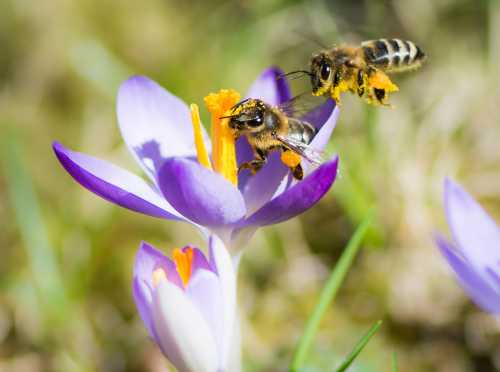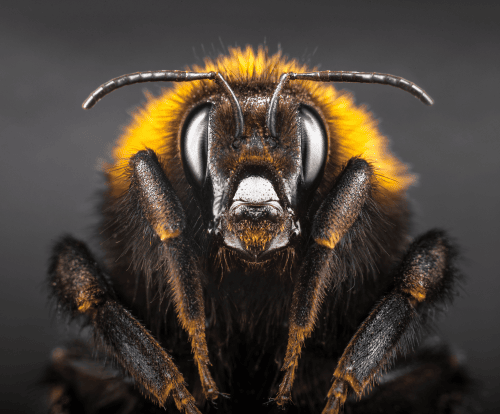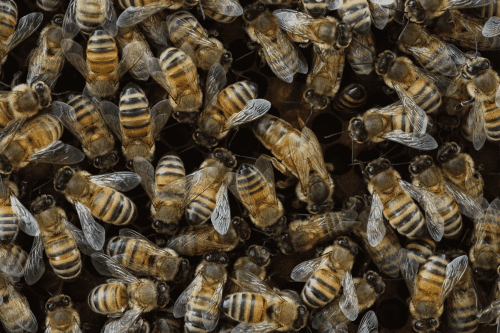Do Bees Have Feelings And Emotions?
I sometimes receive emails telling me about incidents that provoked 'angry buzzing sounds' from bees, or descriptions of bees 'buzzing happily' from flower to flower.
That we humans might interpret the buzzing of bees in certain ways, may seem like anthropomorphism (i.e. the attribution of human characteristics or behaviour to non-humans), but is this actually valid? Do bees have emotions? Can bees get upset or angry, and do bees have feelings?
Do Bees Have Feelings? The Emotional Lives Of Bees
"Natural selection might not look kindly upon individuals that do not know fear, mothers who are indifferent to the loss of their offspring, or social animals for whom it does not feel "rewarding" to be in their social setting. In other words, having at least a range of basic emotions might be part of most animals' "survival tool kit.""
- Lars Chittka, The Mind Of A Bee
Behavioural biologists seek to answer questions on the emotional lives of animals, including bees. Since neither animals nor bees can explain or communicate with us, scientists rely on cognitive behavioural experiments to provide clues as to whether bees and other creatures think and feel.
What clues have scientists found that suggest bees may have feelings?
Pessimistic bees?
In 2011, Bateson et al1 noted that in humans, negative feelings are reliably correlated with pessimistic cognitive biases. A pessimistic cognitive bias can be described as a heightened expectation of bad or negative outcomes (basically, those with negative feelings have been proven to hold an expectation that things will turn out badly - a 'glass half-empty' mentality).
To test whether bees might have the potential to suffer negative emotional states, honey bees were first trained to learn that one stimulus predicts 'reward' (a sugar solution), and to extend their mouthparts in response; and that another stimulus (one containing quinine) was an unpalatable 'punishment' or less valuable reward, and to withhold their mouthparts.
The bees' judgement was then assessed using novel stimulus (solutions with varying degrees of sugar and quinine) to observe how the bees would assess and respond to it.
The authors of the study stated that a pessimistic cognitive bias is revealed by an increased tendency to classify novel stimuli as likely to predict punishment (or a reward of less value).
The test group of bees were then shaken vigorously for 60 seconds, in order to simulate the stressful condition of a predator attack. The bees were then presented with different solutions.
Bees that had been subjected to the anxiety-inducing shake were far more likely to withhold their mouthparts from ambiguous odours, than the control group, suggesting anticipation of 'punishment', and thus indicating a pessimistic cognitive bias ("glass half empty") than the control group.
However, it was notable that the responses of the shaken group of bees to unambiguous sugar solutions, was as before, suggesting that the stressful incident hadn't simply put the bees off drinking any solution at all.

Bateson et al state that shaken bees therefore exhibited pessimistic judgment biases to novel stimuli, and that the shaken bees had an increased expectation of punishment.
But does the experiment show that bees have emotions? The authors of the study themselves note:
"Although our results do not allow us to make any claims about the presence of negative subjective feelings in honeybees, they call into question how we identify emotions in any non-human animal.
It is logically inconsistent to claim that the presence of pessimistic cognitive biases should be taken as confirmation that dogs or rats are anxious but to deny the same conclusion in the case of honeybees."
You can watch a short video by the authors of the study here:
Optimistic bees?
In 2016, Solvi et al2 set out to discover whether bees might alternatively be induced to display a 'positive cognitive bias' in expectation of a reward. In other words, could they demonstrate a 'glass half full' rather than 'glass half empty' response as shown in the Bateson et al study?
In this experiment, bumble bees received a surprise reward in the form of a drop of sugar solution, before they entered a test arena. Indeed, these bees developed a positive cognitive bias in response to ambiguous stimuli.

Do bees seek out substances to make them feel happy?
In his book, The Mind Of A Bee3, Chittka notes that bees have been found to return preferentially to flowers that contain low levels of nicotine or caffeine that might leach into the nectar they excrete!
This raises the question of whether bees seek them for mood altering effects.
References
1. Bateson M, Desire S, Gartside SE, Wright GA. Agitated honeybees exhibit pessimistic cognitive biases. Curr Biol. 2011 Jun 21;21(12):1070-3. doi: 10.1016/j.cub.2011.05.017. PMID: 21636277; PMCID: PMC3158593.
2. Solvi C, Baciadonna L, Chittka L. Unexpected rewards induce dopamine-dependent positive emotion-like state changes in bumblebees. Science. 2016 Sep 30;353(6307):1529-1531. doi: 10.1126/science.aaf4454. PMID: 27708101.
3. Lars Chittka, The Mind Of A Bee, Princeton University Press, 2022.
